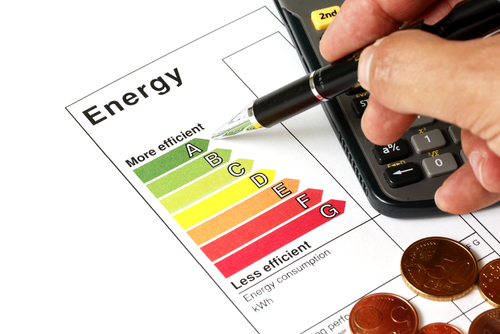
With EPC ratings now a prominent part of letting a property, with stricter government regulations likely, new research suggests substantial numbers of landlords and other owners are blissfully ignorant.
More than six million homeowners across the UK are unaware of their property’s EPC rating, according to the MyGlazing consumer website.
As winter emerges amidst the worst energy crisis on record, the new research reveals that 43 per cent of owners don’t know what their property’s EPC rating is, with almost one in five not even knowing why their property has an EPC rating.
Knowing a property’s EPC rating is crucial for the lettings sector as from 2025 all properties which are being let will need an EPC rating of C or above.
However, the survey also reveals that 45 per cent don’t know where their EPC rating certificate is, with a similar figure not knowing it could be seen online. Some 55 per cent are unclear on how to organise a new EPC rating, and 17 per cent believing a rating cannot be improved.
“Even though EPC ratings have been overlooked in the past, the ongoing energy crisis is only going to reinforce the need for energy efficient homes and buildings across the country” explains Tom Butler from MyGlazing.
“One of the main culprits of heat loss is old draughty windows or doors. If they are not in full working order, homeowners could see up to 24 per cent of heat energy escaping, ultimately meaning homeowners are quite literally throwing money out of the window. Energy costs are soaring, so it’s vital all homeowners do get the true benefit of the heat they are paying for, while avoiding excessive energy bills. One way of doing this is by making energy efficient home improvements.”
Making green home improvements doesn’t just have a positive impact on energy bills, but they also help increase a property’s EPC rating which goes hand in hand with a property increasing in value and buyer appeal.
The research reveals a quarter of homeowners are worried their EPC rating will stop them from selling their property in the future and two in five say they wouldn’t buy a character property due to fears there would be too much work to meet green targets.
Butler concludes: “Energy efficient home improvements can be costly; however, the long-term benefit makes them a real investment. In fact, homeowners said they would pay 15 per cent more for a property which has an EPC rating of C or above.”















%20-%20IMAGE%20Client%20Accounting%20%E2%80%93%20what%20are%20your%20options.jpg)
%20(002).png)












Join the conversation
Jump to latest comment and add your reply
Unfortunately EPC process is not fit for purpose in my opinion - for example if you are replacing double glazing that was fitted after 2002 which is 20 years ago the new windows will not improve your rating even though they will most definitely improve the property. In addition new properties receive a SAP rating which is higher than an RdSAP rating when the property is re-assessed this is not related to changes in efficiency getting stricter but merely the non technical aspect of the RdSAP report despite the information being available on the original SAP. Hopefully as landlords start to realise this there will be a ground swell of movement to improve an out dated process - the SAP report also has no capacity to incorporate things such as air source heat pumps
Using windows as an example to criticise the EPC, is unhelpful and demonstrates a lack of understanding. Windows fitted from 2002 will comply with Building Regs and therefore have a reflective coating such as Pilkington K. That would still be true if fitted today. Where insulation (loft, cavity wall or solid wall) is carried out or a new boiler/heating system fitted, then the EPC Rating will greatly improve. It was unfortunate that when the EPC was born, estate gents were the chosen vehicle to promote them, but in my experience, most were just not interested and certainly had no training, so have tended to rubbish the EPC, due to lack of understanding. Let's face it, estate agents sell property, not EPCs, so why would they be interested. Home owners tend to come across an EPC when selling, whereas landlords will already be aware. It is the letting agents responsibility to educate them or get their preferred EPC provider to guide them, to achieve cost effective improvements, to meet MEES.
Unfortunately I don’t agree we bought a new build that was rated as B in a SAP report but in re assessment it is now a C - solely because the report is RdSAP and not as technical NOT because anything about the property does not meet current guidance but because structural information of the original report is ignored in the reassessment - in what way then it the EPC representative of the energy efficiency of the property
Suggest you talk to the energy assessor that produced the EPC. Details are at the end of the report. They will explain the difference in Ratings. As an observation, a 'B' Rating is expected for a new build, as an on construction SAP EPC is produced. I suspect the RdSAP EPC was c 4-5 SAP points lower, now being a 'C' Rating.
It's important to realise that EPCs are not scientific - they are NOT based only on facts, measurements and proper calculations... they are a politically rigged tool used to justify as well as promote various policies, most of which are themselves simply ideologically based and attempted vote-winners with no sound justification or actual sense behind them.
The calculations themselves have been revised from time to time to reflect changes and shifts in government policy - and certainly not because of any improved understanding in anything to do with genuine energy efficiency... for example, for a long time now the calculations have been heavily skewed to favour heating with gas and any property relying on only electricity (as most of the more recently built flats do) has been given an artificially poor rating EXCEPT for the theoretical ratings for new builds because the big developers are strong lobbyists and won't accept downgrading for their "products", however if you then immediately re-rate the same properties using "ordinary" SAP calculations that everyone else is forced to accept then the rating will immediately fall - as Karen Blick has found (see here post above).
Next year there will be another big shift in policy (not science or anything real) and the calculations are due to become skewed *against* gas for the first time and instead in favour of electricity! Its as fake and simplistic as that... anyone who believes otherwise is probably either naive or else delusional.
It all comes down in the end to political forces exploiting "eco-tyranny" for their own benefit and in the safe knowledge that nobody will get far if they try to openly question or challenge it, instead they'll be roasted as heretics and/or "deniers" or some other bullying tactics will be deployed to silence or discredit them.
Bloody right Barry! I’ve thought it a farce from Day 1 and have seen nothing to change my opinion since. On one occasion I had two ‘identical twin’ houses side by side in a terrace, fully refurbished to the highest possible standards and identical in every respect. Yet for reasons of practicality we ended up with two different assessors attending the two houses. They gave radically different assessments, two EPC ratings apart! (B & D). The difference seemed to hinge on whether heat loss most escaped through the loft or the walls, but there were also disputes about the effectiveness of new windows and TRVs. I never got the two assessors together to fight it out between them because I didn’t care, but maybe it would have been fun to witness them argue out the obvious discrepancies.
Incidentally, I’ve just returned from America where no one at ground level seems to give a shiit about energy efficiency, recycling, or waste. Trying to seek out recycling facilities was a laughable, futile affair and the endless consumption and throwing away of brand new, often unused, plastics, was nothing short of a disgrace. As long as that’s going on in the big population countries, us changing our lightbulbs or spending £6000 on floor insulation to save £40 on annual bills is a nonsense.
Had a bad day at the office, Barry X. Conspiracy theorist. Made me laugh.
James Fraser, you have had an even worse day at the office. In your first paragraph, there will be good reasons why there was a difference in Ratings. It has nothing to do with light bulbs! I am an energy assessor and find it so depressing that those that don't understand an EPC, are the ones that make uninformed comments, as they think they are being funny.
Please login to comment